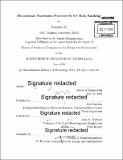Situational awareness framework for risk ranking
Author(s)
Li, Rongsha
DownloadFull printable version (8.186Mb)
Other Contributors
Massachusetts Institute of Technology. Computation for Design and Optimization Program.
Advisor
Abel Sanchez and John R. Williams.
Terms of use
Metadata
Show full item recordAbstract
Today, organizations are generating large volumes of data. However, the challenge of extracting valuable information from the data has been a large and long-standing problem. Here, we address the problem of quantifying risks and detecting fraud in heterogeneous financial big data. Great financial losses are pressuring institutions to devise innovative solutions for risk and fraud detection. Current approaches in government suffer from issues such as high false positive rates and low adaptability to the continuous evolution of newer fraud. In this thesis, we propose an open and extensible framework called "Situational Awarness FrAamework for RIsk ranking" (SAFARI). SAFARI aims to quantify and rank risk with unlabeled, complex data in the financial world. The framework integrates and analyzes different perspectives of financial data, and extends risk scores for decision makers. SAFARI also utilizes machine learning techniques to learn from examined cases to improve the calculation of risks and adapt to the changing behavior of fraudulent activities. The work includes designing, implementing, testing, extending and evaluating the proposed framework. In the overpayment detection scenario, results show SAFARI can effectively find overpayments with low false positive rates. Furthermore, SAFARI can be extended to assist decision making in a variety of environment thanks to its general applicability.
Description
Thesis: S.M., Massachusetts Institute of Technology, School of Engineering, Center for Computational Engineering, Computation for Design and Optimization Program, 2015. Cataloged from PDF version of thesis. Includes bibliographical references (pages 75-76).
Date issued
2015Department
Massachusetts Institute of Technology. Computation for Design and Optimization ProgramPublisher
Massachusetts Institute of Technology
Keywords
Computation for Design and Optimization Program.